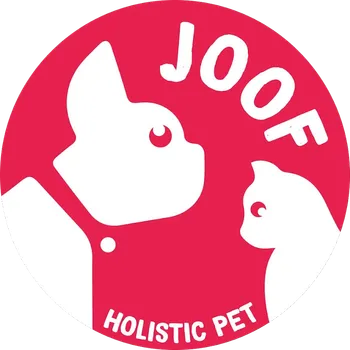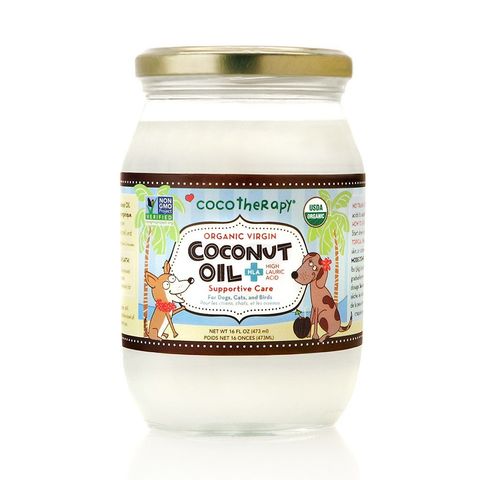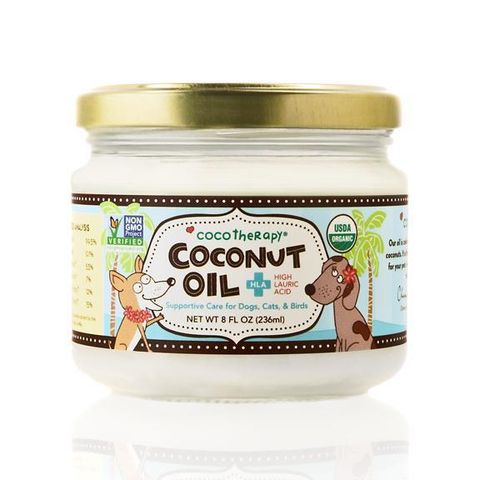
Recommended Article #06Oct24
Hi, Pet Parents Resources is a platform, where we share with you, what we research as pet parents ourselves. Here, we curate and give, what we hope would be, interesting to important informative articles, videos and even podcasts from our brand creators, experts, researchers, and more all over the world, to aid you in making better choices for your pets.
This recommended article "The Top 3 Myths About Coconut Oil and Pets" is curated and sourced from CocoTherapy. If you loved this article, please do feel free to share it around.
The Top 3 Myths About Coconut Oil and Pets
As with many health foods and supplements, there's a lot of misinformation about coconut oil. We hope this post will be useful for pet owners who are concerned about feeding coconut oil to pets with certain health conditions. Keep reading for our top 3 myths about coconut oil and pets.
Myth # 1: Coconut oil may cause fatty liver disease in cats
Fatty liver disease (hepatic lipidosis) is a condition which is characterized by a buildup of fat in the liver. This happens when a cat, who is typically over-weight, loses weight rapidly because it has suddenly stopped eating.
When a cat stops eating, several things happen in its body. First, the body turns to reserves of fat for energy. Fat is then transported to the liver and needs bile to be broken down. Only then can it be used as energy. Unfortunately, when cats go without food, their liver cannot metabolize fat efficiently. This is what causes the liver to become "fatty". The rapid buildup of fat cells in the liver prevents it from functioning normally.
Now for the good news. Coconut oil is quickly and easily metabolized for energy because it doesn't need liver bile acids to be digested. When fed to cats that are not eating or anorexic, coconut oil provides a ready source of energy and prevents the body from turning to its reserves of fat. This means that far from causing fatty liver disease, coconut oil is actually very beneficial for cats that are in danger of developing the condition.
The following quote is from Dr. Daniel Watson, DVM., a Feline Specialist at College Station Cat Clinic in Wheaton, Illinois:
"Being carnivores, cats have an innate ability to digest proteins and fats. Hepatic lipidosis (fatty liver disease) may occur when a cat suddenly stops eating over a period of time. When the cat becomes undernourished, the body automatically moves fat from its reserves to the liver to be converted to energy. When the cat is in starvation mode, the liver is not efficient in processing fat, and much of the fat is stored in the liver cells, resulting in a fatty and low-functioning liver.
Simply giving a cat coconut oil, an MCT fat, will not give a cat a fatty liver. MCTs (medium-chain triglycerides) do not need bile to be metabolized, and can be given to animals with biliary disease, which will provide a ready source of lipid energy."
Myth # 2: Coconut oil is bad for animals with pancreatitis, or may cause pancreatitis in animals
Pancreatitis is inflammation of the pancreas – a gland located next to the stomach. The pancreas produces enzymes that aid the digestive process. When it becomes inflamed, digestive enzymes can leak into the abdominal area causing inflammation of internal organs, infection, and even death.
Pets with pancreatitis lack sufficient pancreatic enzymes to break down fats, and cannot absorb them efficiently. That's why most types of fats should be strictly limited in their diet. About two-thirds of the fats in coconut oil are medium-chain triglycerides (MCTs). Unlike other types of fats, MCTs do not require pancreatic enzymes for digestion. This means that coconut oil is well tolerated by pets with fat malabsorption issues.
CocoTherapy co-founder Carmina’s cat, Oliver is 16 and has chronic idiopathic pancreatitis. She feeds him a high protein, low fat diet, and coconut oil for lipid energy. Coconut oil provides calories needed for Oliver's body to produce energy. It also helps him absorb fat-soluble vitamins. This means that although Oliver needs to be on a low-fat diet, he can safely eat coconut oil because it does not need pancreatic lipase for digestion.
Myth # 3: Coconut oil should never be given to animals with malabsorption disorders
Medium-chain triglycerides (MCTs) do not require pancreatic enzymes for digestion. This means that they are well tolerated by pets with chronic pancreatitis, EPI, and other forms of malabsorption.
Because MCTs are efficiently converted into fuel for immediate use by the body, coconut oil can be added to the diet to replace lost calories and provide energy. The MCTs in the oil can also help your pet's body absorb essential vitamins and nutrients from food and supplements.
Protein losing enteropathy (PLE) is one example of a condition which is associated with malabsorption. The condition is characterized by excessive protein loss from the gastrointestinal tract. Symptoms can include decreased appetite, vomiting, diarrhea, and weight loss, and even death.
Pets with PLE are usually prescribed diets with minimal fat and a sufficient amount of high-quality protein to help treat the condition. But removal of fat from the diet can result in weight loss and malnourishment. In an article about lymphangiectasia, a disorder which can lead to PLE, Dr. Karen Becker, DVM., NMD., advocates the use of coconut oil for pets with malabsorption issues:
"I recommend patients consume medium-chain triglycerides (MCTs), as these helpful fats are diffused across the GI wall with no digestion required. The natural form of MCTs I prefer for my patients is organic raw coconut oil."
CocoTherapy co-founder Charisa's pet Yorkie, Camilley suffered from lymphangiectasia which led to PLE. Coconut oil has proved very effective as an additional source of energy for Camilley, and it also soothes the mucosal lining of her gut.
Wrapping Up
It is important to remember that dogs and cats are carnivores. This means that they are biologically designed to process proteins and fats efficiently. By nature, our pets' bodies contain more good cholesterol than bad cholesterol, no matter what types of fats they eat. This protects them from conditions such as heart attacks, strokes, or coronary artery diseases.
Therapeutic-grade oil such as CocoTherapy coconut oil is a natural, saturated fat that is backed by science and has been successfully used to improve human and animal health for centuries. Saturated fat is a necessary part of the diet of pets and people, aiding many processes within the body.
Far from being a danger to health, coconut oil is actually one of the best sources of healthy saturated fat found in nature. As a rule of thumb, it is better to limit food ingredients such as grain, wheat, rice, and soy. Unlike fats, these foods can cause inflammation and do not provide any significant health benefits to animals.
The good news is, you can purchase CocoTherapy Virgin Coconut Oil from our retailers today!
You may find more interesting reads from JOOF Holistic Pet today! Look out for loads of information on our product pages, social media, especially our Pet Parent Resources page.
JOOF Holistic Pet, a Singapore online pet store that focuses on the holistic well-being of your beloved furkid. Our recommended products aim to support and improve health, emotional and physical well-being, and help your pet have a better quality of life without compromise. Look out for Essential, Trendy and Premium quality pet products that are specially curated, with the pet parents concerns' as a priority.
This blog first appeared on the CocoTherapy website, where this article "The Top 3 Myths About Coconut Oil and Pets" was curated and sourced from.
Original source: The Top 3 Myths About Coconut Oil and Pets
Thank you for reading! We hope to bring you more informative and exciting articles from other resources and our varying retail brands. Through them, we hope more and more pet parents could become their pet's wellness heroes, proactively taking control of their pets’ foundational health from within, with JOOF Holistic Pet - www.joofholisticpet.sg 😊
Disclaimer:
JOOF Holistic Pet has curated and reproduced this article in good faith, which may contain an element of consumer opinion, but cannot be held responsible for any information inaccuracies in it or any use assumed from this information by the reader. JOOF Holistic Pet welcomes positive recommendations for holistic healthcare products, but does not necessarily endorse the author’s opinion. We acknowledge each animal is an individual and may react differently to the highlighted product/s, and that there may also be other similar effective products available.
General recommendations made by JOOF Holistic Pet are solely for informational and educational purposes, and are not a substitute for the appropriate veterinary care. It is important to always consult professional help if you have concerns about your furkid’s health.


